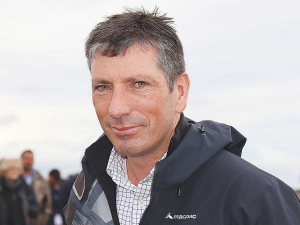Damien O’Connor: NZ united on global trade
When it comes to international trade, politicians from all sides of the aisle are united, says Labour's trade spokesman Damien O'Connor.
 Beef+Lamb NZ chief executive Sam McIvor says its levy-funded farm plan covers much of the Government’s new guidance.
Beef+Lamb NZ chief executive Sam McIvor says its levy-funded farm plan covers much of the Government’s new guidance.
An agreed framework on farm plans has been made between Government and the farming sector.
Last week, 'The Good Farm Planning Principles Guide' was released, which Agriculture Minister Damien O'Connor claims will make it easier for farmers and growers to integrate future greenhouse gas emissions and freshwater regulatory requirements into their farm planning.
"The guide is the gateway to an integrated farm planning approach; that is, each farmer looking at their farm as a whole, from soils to staff, and from emissions to EBIT."
O'Connor says the guide was developed by the Integrated Farm Planning Steering Group, which was made up of representatives from farming industry organisations, councils, Māori agribusiness and government. He says the group drew from the existing planning programmes of the agriculture and horticulture sectors, as well as current regulatory frameworks such as health and safety.
"I'm conscious of the good planning practice that is already happening within our various sectors and I think this framework reflects that," O'Connor said.
"However, some farmers still need some support and guidance. With new farm planning requirements for freshwater and climate change coming down the line, we need to bring all farmers along on the journey. This guide is the first step - putting in place baselines to help people combine and improve their existing farm planning, so that they are ready for the change that is coming."
In the recent Budget, the Government allocated $37 million over four years to farm planning. This aims to deliver 100 more people to provide advice to farmers and growers with aspects of planning.
O'Connor says the steering group will continue to work with industry to align their assurance plans with the new farm plan framework.
"That will be in place by the end of 2021 and a significant step in a programme of work that will go into 2022."
Meanwhile, Beef+Lamb NZ is reassuring farmers that its levy-funded farm plan covers much of the Government's new guidance on integrated farm planning.
"B+LNZ's new farm plan launched earlier this year is based on an integrated approach with the environment module covering soils, freshwater ecosystem health, forage cropping, climate change and biodiversity," chief executive Sam McIvor says.
"B+LNZ plans to add other modules in response to farmer and market demand in the future. The B+LNZ farm plan is also aligned with the New Zealand Farm Assurance Programme."
McIvor also emphasises that this guidance is non-regulatory and adds that an 'integrated approach' is at the heart of the organisation's new farm plan and the New Zealand Farm Assurance Programme.
The World Wide Sires National All Day Breeds Best Youth Camp Best All Rounder plaudit has become family affair, with 2026 Paramount Cup winner Holly Williams following in her sister Zara's footsteps.
DairyNZ is giving New Zealand farmers a unique opportunity to gain hands-on governance and leadership experience within the dairy sector.
Herd improvement company LIC has posted a 5.2% lift in half-year revenue, thanks to increasing demand for genetics.
According to the latest Fresh Produce Trend Report from United Fresh, 2026 will be a year where fruit and vegetables are shaped by cost pressures, rapid digital adoption, and a renewed focus on wellbeing at home.
The Roar is a highlight of the game hunting calendar in New Zealand, with thousands of hunters set to head for the hills to hunt male stags during March and April.
OPINION: The past few weeks have been tough on farms across the North Island: floods and storms have caused damage and disruption to families and businesses.

OPINION: Meanwhile, red blooded Northland politician Matua Shane Jones has provided one of the most telling quotes of the year…
OPINION: This old mutt has been around for a few years now and it seems these ‘once in 100-year’ weather…